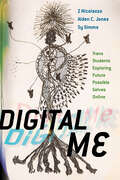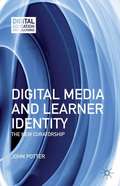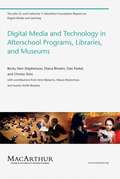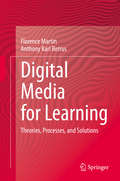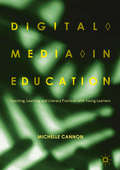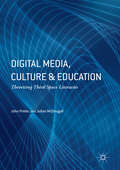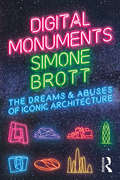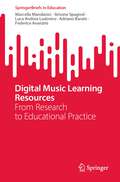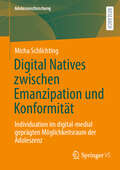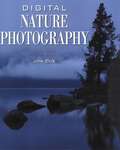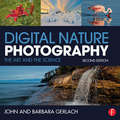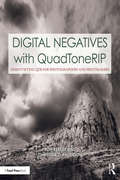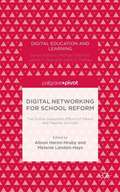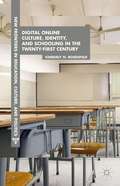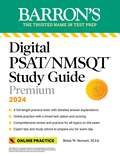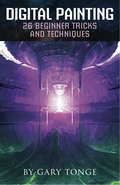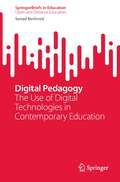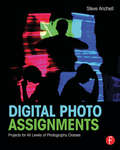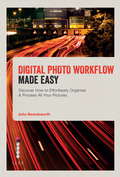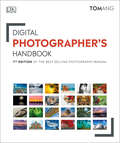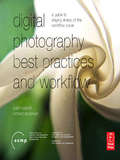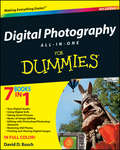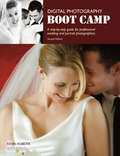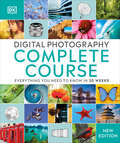- Table View
- List View
Digital Marketing: Integrating Strategy and Tactics with Values, A Guidebook for Executives, Managers, and Students
by Ira Kaufman Chris HortonDigital Marketing: Integrating Strategy and Tactics with Values is an easy-to-understand guidebook that draws on the latest digital tactics and strategic insights to help organizations generate sustainable growth through digital integration. It provides a roadmap to adopt a digital mindset, incorporate digital trends strategically, and integrate the most effective digital tactics and tools with core values to achieve competitive advantage. Bringing the reader through its five-step Path to Digital Integration (Mindset, Model, Strategy, Implementation, and Sustainability), Digital Marketing seeks to Outline the key drivers of change and leading digital marketing trends executives need to understand and incorporate to drive business opportunity. Evaluate the digital channels and technologies management teams can leverage to execute a successful Integrated Digital Marketing strategy. This includes insight into the latest digital tactics (website, social, mobile, search, content, and email marketing; data analytics) and social tools (Facebook, Twitter, YouTube, LinkedIn, Instagram, Pinterest, and Google Plus). Discover the impact of digital transformation on the organization, from the effect of digital tactics on the customer experience (CX) to the value of integrating internal digital strategies to facilitate collaboration and innovation. Guide aspiring leaders on how to combine core values and business goals with progressive digital strategies, tactics, and tools to generate sustainable outcomes for all stakeholders. This interactive guidebook provides a truly Connected Digital Experience (CDE): the Zappar augmented reality mobile app allows the reader to activate the "Discover More" and "Play Video" icons found throughout the book, instantly connecting the reader, via their mobile device, to additional content housed on our companion website, Digital Marketing Resource Center (www.dmresourcecenter.org). "Play Video" icons incorporate point-in-time video commenting solution Vusay to enable interactive social conversations around each video. Digital Marketing is the ideal guide for aspiring leaders - executives, instructors, owners, entrepreneurs, managers, students - at all stages of digital literacy.
Digital Me: Trans Students Exploring Future Possible Selves Online (The American Campus)
by Z Nicolazzo Alden C. Jones Sy SimmsThe internet is where trans people have come to become. Creating an identity in digital space can be important for how trans people learn about themselves, their communities, and the possibilities available to them. While the internet and digital space is not the only way of coming to understand oneself in a community, it is a space of liberatory possibility and creativity. There is room to invent what may not yet exist for gender on the edges of what many consider to be “real.” For many, digital life can be the site of play, joy, and connection –even while the internet is not a harm-free space nor universally available. This book seeks to understand the complexities at play in the digital realm and the implications that have for gender, digital life, and higher education.
Digital Media and Learner Identity
by John PotterDrawing on research into autobiographical video production by young learners to present a theory of curatorship and new media, this work explores facets of literacy and identity theory which provided the initial frames for examining the work and shows how 'curatorship' works as a metaphor for new cultural and literacy practices.
Digital Media and Technology in Afterschool Programs, Libraries, and Museums
by Anne Balsamo Christo Sims Becky Herr Stephenson Dan Perkel Maura Klosterman Susana Smith Bautista Diana RhotenDigital media and technology have become culturally and economically powerful parts of contemporary middle-class American childhoods. Immersed in various forms of digital media as well as mobile and Web-based technologies, young people today appear to develop knowledge and skills through participation in media. This MacArthur Report examines the ways in which afterschool programs, libraries, and museums use digital media to support extracurricular learning. It investigates how these three varieties of youth-serving organizations have incorporated technological infrastructure and digital practices into their programs; what types of participation and learning digital practices support; and how research in digital media and learning can contribute to better integration of technology within and across these organizations. The authors review a range of programs (including the long-running Computer Clubhouse movement, established in 1993 in partnership with MIT's Media Lab), and then use the idea of "media ecologies" to investigate the role that digital media play (or could play) in these "intermediary spaces for learning." They call for less anecdotal, more empirical and methodologically sound studies to help us understand the affordances of digital media for learning within and across these programs; for research focused on the relationship between digital media and the effectiveness of youth-serving organizations; and for further study of schools within childhood media ecologies.
Digital Media for Learning: Theories, Processes, and Solutions
by Florence Martin Anthony Karl BetrusThis book provides a comprehensive overview on the theories, processes, and solutions relevant to effectively creating, using, and managing digital media in a variety of instructional settings. In the first section of the book, the authors provide an overview of the theories, development models, and principles of learning with digital media. In the second section, the authors detail various digital media solutions, including: Instructional Videos, Instructional Simulations and Games, Online Learning, Mobile Learning, and Emerging Learning Technologies. Overall, this book emphasizes the theoretical principles for learning with digital media and processes to design digital media solutions in various instructional settings. The readers are also provided with multiple case studies from real world projects in various instructional settings.
Digital Media in Education: Teaching, Learning and Literacy Practices with Young Learners
by Michelle CannonThis book argues for dynamic and relevant school experiences for primary and early secondary learners that embed digital media production. It proposes a vision of literacy that combines new technologies with multiple modes of meaning-making. Drawing on theories related to cultural studies, media literacy, anthropology, and creativity, the author explores learning strategies with digital media based on an empowering, values-driven framework. The book advances innovative teaching methods, critiquing educational ‘reforms’ that marginalise media and fail to engage with the complex tensions and textures of modern pedagogy. Positioning film and media-making as vital practices in schools that nurture the skills, dispositions and competencies of modern literacy, the model foregrounds connections between human agency, cognition, and creative practice. This innovative book will appeal to students and scholars of creativity, digital media production, primary education and literacy.
Digital Media, Culture and Education
by John Potter Julian McdougallThis book provides a critical commentary on key issues around learning in the digital age in both formal and informal educational settings. The book presents research and thinking about new dynamic literacies, porous expertise, digital making/coding/remixing, curation, storying in digital media, open learning, the networked educator and a number of related topics; it further addresses and develops the notion of a 'third space literacies' in contexts for learning. The book takes as its starting point the idea that an emphasis on technology and media, as part of material culture and lived experience, is much needed in the discussion of education, along with a criticality which is too often absent in the discourse around technology and learning. It constructs a narrative thread and a critical synthesis from a sociocultural account of the memes and stereotypical positions around learning, media and technology in the digital age, and will be of great interest to academics interested in the mechanics of learning and the effects of technology on the education experience. It closes with a conversation as a reflexive 'afterword' featuring discussion of the key issues with, amongst others, Neil Selwyn and Cathy Burnett.
Digital Monuments: The Dreams and Abuses of Iconic Architecture
by Simone BrottDigital Monuments radically explodes "iconic architecture" of the new millennium and its hijacking of the public imagination via the digital image. Hallucinatory constructions such as Rem Koolhaas’s CCTV headquarters in Beijing, Frank Gehry’s Guggenheim Museum in Bilbao and Zaha Hadid’s Performing Arts Centre in Abu Dhabi are all introduced to the world by immortal digital imagery that floods the internet—yet comes to haunt the actualised buildings. Like holograms, these "digital monuments," which violently push physics and engineering to their limits, flicker eerily between the real and the unreal—invoking fantasies of omnipotence, immortality and utopian cities. But this experience of iconic architecture as a digital dream on the ground conceals from the urban spectator the social reality of the buildings and the rigidity of their ideology. In 18 micro-essays, Digital Monuments exposes the stereotypes of iconic architecture while depicting the savagery of the industry, from the Greek and Spanish crises triggered by financialised iconic development to mass labour-deaths on construction sites in the UAE.
Digital Music Learning Resources: From Research to Educational Practice (SpringerBriefs in Education)
by Marcella Mandanici Simone Spagnol Luca Andrea Ludovico Adriano Baratè Federico AvanziniThis book offers an overview of the complex world of digital materials for music education and of their possible use in the everyday practice of music teachers. It presents a multidimensional taxonomy of digital materials for music education. Through the taxonomy it is possible to derive a clear framework of the whole field and to perform analysis of the state of art. The book shows the use of this flexible and powerful knowledge tool for reviewing the digital materials in the various domains and dimentions. The book provides researchers and designers with an overview of what has already been designed, proposed and tested in the field. It also offers music teachers a wider perspective of the possibilities connected to current technologies in the field of music education, and it suggests possible interrelationships between research and music education practices.
Digital Natives zwischen Emanzipation und Konformität: Individuation im digital-medial geprägten Möglichkeitsraum der Adoleszenz (Adoleszenzforschung #14)
by Micha SchlichtingIn dieser Studie geht es um junge Menschen, die zur ersten Generation gehören, die in eine hochgradig digitalisierte und mediatisierte Welt hinein sozialisiert wird. Es geht darum zu erforschen, wie die Nutzung digitaler Medien mit den ihnen inhärenten Strukturen sich auf adoleszente Individuation auswirkt. Digitale Medien bieten den Jugendlichen mittels Präsenz und Form sowohl neuartige Möglichkeiten der Individuierung als auch Herausforderungen und Hemmnisse. Man könnte also sagen, sie bieten Adoleszenten einen medial erweiterten Möglichkeitsraum, der mit dem analogen psychosozialen Möglichkeitsraum der Adoleszenz auf je individuelle Weise verschwimmt und dessen mediale Form einerseits auf produktive und andererseits auch auf kontraproduktive Weise in den Prozess der adoleszenten Individuierung eingreifen kann. Digitale Medien können somit zur „Entstehung des Neuen in der Adoleszenz“ beitragen. Es werden typische Aneignungsweisen digitaler Medien im Prozess adoleszenter Individuierung rekonstruiert. Dabei wird den Fragen nachgegangen, inwieweit emanzipierende Potenziale für die Bewältigung adoleszenter Entwicklungsaufgaben entstehen können und ob auch ein Zusammenhang mit einer den Jugendlichen immer wieder zugeschriebenen Konformität bestehen kann.
Digital Nature Photography
by Jon CoxDigital Nature Photography is the definitive how-to book on photographing nature with a digital camera. Focusing primarily on the art of taking the picture in the field--rather than just manipulating the image after it has been shot--this comprehensive guide is geared to the nature photographer who is fairly new to the world of digital cameras. Packed with step-by-step directions and resplendent full-color examples from the author's own body of work, readers will receive hands-on practice with lighting, composition, landscapes, sunrises, sunsets, animal portraits, close-ups, manipulating and storing images, and much more. The essential reference for every level of photographer, Digital Nature Photography guides the reader through a magnificent and unique visual experience into the natural world.
Digital Nature Photography: The Art and the Science
by John and GerlachIdentifying a beautiful image in nature is easy, but capturing it is often challenging. To truly seize the essence of a photograph shot out of the studio and in the world requires an artistic eye and impeccable set of photographic techniques. John and Barbara Gerlach have been teaching photographers how to master the craft of photographing nature and the outdoors through their workshops and best-selling books for more than twenty years. Now, equipped with brand new images to share and skills to teach, this celebrated photo team is sharing their latest lessons in the second edition of Digital Nature Photography. Notable revisions in this new edition include introducing the concepts of focus stacking and HDR, as well as expanded discussions of multiple exposure, wireless flash, RGB histograms, live view, shutter priority with auto ISO, hand-held shooting techniques, and the author’s equipment selections. The inspiring imagery in this book covers a broader range of subjects than before including ghost towns, the night sky, animals, and sports, in addition to the classic nature photographs we expect from this very talented author team. This book is a comprehensive guide to one of the broadest subjects in photography, explained and dymystified by two respected masters.
Digital Negatives with QuadToneRIP: Demystifying QTR for Photographers and Printmakers (Contemporary Practices in Alternative Process Photography)
by Christina Z Anderson Ron ReederDigital Negatives with QuadToneRIP is a text that fully explores how the QuadToneRIP printer driver can be used to make expert digital negatives. The book takes a comprehensive, Òunder-the-hoodÓ look at how Roy Harrington’s QTR printer driver can be adapted for use by artists in several different creative practice areas. The text is written from the Mac/Photoshop point of view. The book is divided into three parts. Part One is a step-by-step how-to section that will appeal to both beginning and more advanced practitioners. Part One includes quickstart guides or summary sheets for beginning students who want to jump into using QTR before understanding all of its functional components. Part Two addresses dimroom, darkroom, and printmaking practices, walking the reader through brief workflows from negative to print for lithium palladium, gum bichromate, cyanotype, salted paper, kallitype, silver gelatin and polymer photogravure, with a sample profile for each. It also includes an introduction to a new software iteration of QTR: QuickCurve-DN (QCDN). Part Three is devoted to contemporary practitioners who explain how they use QTR in their creative practice. The book includes: A list of supplies and software needed A summary QTR glossary with a simple explanation of how each function works A sample walk-through to create a QTR profile from start to finish How to linearize profiles with simple to more exacting tools A visual guide to modifying functions Quickstart guides for many of the workflows Instructions for crafting monochrome, duotone, tricolor, and quadcolor negatives Instructions for using QTR to print silver gelatin in the darkroom Instructions for using QTR to print alternative processes in the dimroom Instructions for using QTR to print polymer photogravure in the printmaking room Introductory chapter to QuickCurve-DN software Troubleshooting common QTR problems Generic starter profiles for processes discussed Contemporary artists: their work and QTR process. Learning how to craft expert digital negatives can be a bit overwhelming at the outset. Digital Negatives with QuadToneRIP makes the process as user-friendly as possible. Like other books in the series, Digital Negatives with QuadToneRIP is thoroughly comprehensive, accessible to different levels of learner, and illustrative of the contemporary arts.
Digital Networking for School Reform: The Online Grassroots Efforts of Parent and Teacher Activists
by Alison Heron-Hruby Melanie Landon-HaysPresenting school reform grassroots activists - teachers, parents, and organizers alike - in their own words, the editors document the newly emerged role of digital networks of activists in school reform and analyze their efforts as acts of critical literacy.
Digital Online Culture, Identity, and Schooling in the Twenty-First Century
by Kimberly N. RosenfeldDigital Online Culture, Identity and Schooling in the Twenty-First Century provides a cultural, ideological critique of identity construction in the context of virtualization. Kimberly Rosenfeld explores the growing number of people who no longer reside in one physical reality but live, work, and play in multiple realities. Rosenfeld's critique of neo-liberal practices in the digital environment brings to light the on-going hegemonic and counter-hegemonic battles over control of education in the digital age. Rosenfeld draws conclusions for empowering the population through schooling, and how it should understand, respond to, and help individuals live out the information revolution.
Digital PSAT/NMSQT Study Guide Premium, 2024: 4 Practice Tests + Comprehensive Review + Online Practice (Barron's Test Prep)
by Brian W. Stewart M.Ed.Barron&’s Digital PSAT/NMSQT Study Guide Premium, 2024 includes everything you need to be prepared for exam day with comprehensive review and practice that reflects the new digital PSAT/NMSQT!All the Review You Need from an SAT ExpertAn expert overview of the new digital PSAT/NMSQT, including answers to frequently asked questions, advice on curbing test anxiety, techniques for the new digital interface, and information about the National Merit Scholarship programIn-depth subject review and practice questions covering the revised sections of the test for Reading and Writing and MathThe latest strategies for success on the newest types of digital SAT questions, such as Command of Evidence, Words in Context, Rhetorical Synthesis, and TransitionsTips throughout from the author--an experienced SAT tutor and test prep professionalPractice with Confidence4 full-length practice tests--3 in the book and 1 online--including 1 diagnostic test to assess your skills and target your studyingAdditional practice questions on each subject throughout the review chaptersAdvanced skill-building practice drills for students seeking National Merit Scholarship recognitionDetailed answer explanations for all practice questionsOnline Practice1 full-length practice test onlineDetailed answer explanationsScoring to check your learning progressAn online vocabulary appendix for extra review
Digital Painting, 26 Beginner Tricks and Techniques
by Gary TongeDigital Painting, 26 Beginner Tricks and Techniques will show you how to get more out of your software and improve your digital artwork. Gary Tonge, one of the world's leading digital art pros, offers state-of-the-art advice for beginners covering every aspect of computer-generated art--from lighting and color basics to working with layers. Clear instruction, screen shots and striking art make these tips immediately applicable so you can begin right away.
Digital Pedagogy: The Use of Digital Technologies in Contemporary Education (SpringerBriefs in Education)
by Senad BećirovićThis book systematically approaches the topic of the relatively new field of digital pedagogy and provides valuable insights for teachers and students, education policymakers, leaders in education, and others whose professional engagement is related to education in modern society. It discusses topics including what digital pedagogy involves as well as its main characteristics and significance for the future of education, the impact of the coronavirus pandemic on the teaching and learning process, digital literacy and digital citizenship, development of digital competencies of teachers, and the reasons for and challenges of the digital transformation of education systems. The findings presented in this book help education policymakers to adopt effective strategies for digitalization of educational institutions. Furthermore, this book enables experts involved in the development and improvement of curricula to respond well to modern challenges and to adapt them to the modern needs of students, society, and scientific fields. This book also serves as a useful resource for pre-service and in-service teachers in their development of digital competencies.
Digital Photo Assignments: Projects for All Levels of Photography Classes (Photography Educators Series)
by Steve AnchellThis collection of more than 40 photo assignments is designed to help all students—from beginning freshmen to experienced seniors—improve or reinvigorate their work and reach their full potential as photographers. Whether you are building a syllabus for your first photography class, revitalizing assignments for your students, or looking to add DSLR video, workflow, or color correction to your class, you will find a wealth of ideas in this wonderful working guide. The assignments begin with using the camera, and progress through learning composition and lighting, working in genres, building a portfolio and more.
Digital Photo Workflow Made Easy: Discover How to Effortlessly Organise & Process All Your Pictures
by John BeardsworthDo you know where all your photos are? Can you retrieve every landscape shot or portrait you've ever taken with a few keystrokes and a click of the mouse? Are you looking forward to processing those hundreds or thousands of holiday snapshots? There's no reason why you shouldn't, and this book holds all the answers, and quite a few expert secrets as well.Learn to take advantage of the processes and features of your software of choice to streamline your photo workflow. With advanced methods, tried and tested by an expert photographer, you'll be set on a straightforward path to great, reliable results in no time at all.
Digital Photographer's Handbook: 7th Edition of the Best-Selling Photography Manual (DK Tom Ang Photography Guides)
by Tom AngDiscover how to get the very best from your photography with clear step-by-step guidance from expert photographer, Tom Ang. In this fully comprehensive photography companion, renowned photographer and teacher Tom Ang teaches you how to capture, enhance, and transform your photographs.The first half of the book explains all of the essential techniques that every photographer needs to learn - from how to handle your camera correctly and understand its features, to composing a successful shot.The second half develops your understanding of photography, guiding you through a range of projects that focus on different photographic genres and subjects, including landscapes, cityscapes, and live events. It explains how to digitally enhance your images, not only to improve the original shot, but also to apply creative techniques that will take your image to a new level. This section also gives advice on the best way to share your work, to choosing the most suitable equipment, and should you wish, how to develop a career in photography.
Digital Photographic Workflow Handbook: A Guide to Staying Ahead of the Workflow Curve
by Patricia RussottiThe current existing workflow content out there deals only in RAW or DAM (Digital Asset Management) and can be extremely difficult and daunting to read. The Digital Photographic Workflow Handbook is a coherent, concise guide to all of the aspects of workflow that digital photographers and digital imagers need from shooting to archiving and everything in between -- written in a way that an artist/photographer can understand. It also has resources and links to stay current and up to speed with the rapid changes in technology, a Website that you can return to for the latest advances in workflow, and a glossary to use as you develop Standard Operating Procedures to synthesize your workflow and communication processes. This book will give you all of the workflow steps you will need -- from shooting to archiving and everything in between -- and is written in a way that a way that you can understand. This handbook is software version independent and focuses more on the key fundamentals that are a constant from software version to software version.
Digital Photography All-in-One Desk Reference For Dummies
by David D. BuschIt's easy to get started in digital photography and take great photos with Digital Photography All-in-One Desk Reference For Dummies! This fourth edition helps you choose the right camera, compose and capture great photos, load them onto your computer, enhance them with Photoshop, and share them online or as prints. Here's how to compare digital camera features, choose accessories, and explore digital SLRs; get great close-ups, sports and action shots, and portraits; and use image editors including Paint Shop Pro, Corel PhotoPaint, PhotoImpact, and Adobe's popular Photoshop and Photoshop Elements. You'll also discover how to:Compose pictures that communicateMake the most of macro photographyGet great candid photosCreate the right lighting and use cool lighting gadgetsTake advantage of six cool improvements in digital SLRsFollow great ideas for getting your photos publishedTake great shots in a wide range of situationsLearn to repair and restore treasured heirloom photosTurn your images into greeting cards, T-shirts, online albums, or printsYou'll quickly find what you need in one of the seven minibooks:Your Digital StudioUsing Digital SLRsTaking Great PicturesBasics of Image EditingEditing with Photoshop/Photoshop ElementsRestoring Old PhotosPrinting and Sharing Digital ImagesDigital Photography All-in-One Desk Reference For Dummies, 4th Edition gets you up to speed on digital cameras and all the tricks, so you can truly enjoy your digital photography experience.
Digital Photography Boot Camp
by Kevin KubotaDesigned to give professional photographers of all skill levels a complete look at the working digital studio, this reference goes from start to finish-from setting up the camera and capturing the best possible images to organizing, enhancing, and printing the completed photos. Written by an experienced, successful professional photographer and lecturer, this newly revised guide takes a lighthearted approach to complete foundation information, as well as advanced tips and tricks for those ready to push their digital imaging to the next level. Intensive chapters cover Photoshop essentials for retouching or adding artistic effects, managing workflow and clients, and the many finishing options in the digital medium, including slide shows, DVDs, and magazine-style albums and collages. With a clear and upbeat approach, this reference provides quality technical information, while inspiring photographers to look closely at their work to see where a little finesse could elevate their businesses.
Digital Photography Complete Course: Learn Everything You Need to Know in 20 Weeks (DK Complete Courses)
by DKGrab your camera and learn everything you need to know to improve your photography in just 20 weeks.Introducing Digital Photography Compete Course - the perfect beginner&’s learning program for any aspiring photographer, this photography book aims to teach you everything you need to know about photography in just 20 weeks, through easy-to-understand tutorials. It&’s time to start using your camera to its full potential, and this photography book for beginners can help you do just that. Combining tutorials, step-by-step photo shoots, practical assignments, and fun Q&As, this brilliant book on photography can help you untangle photographic jargon such as aperture, exposure, shutter speed, and depth-of-field; teach you top tips and tricks surrounding the range of modes on bridge and system cameras, and help you to master composition for that perfect photo!Become a photography expert in no time, as you explore:- Review, practice and experiment sections to put photography knowledge to the test - Technical concepts are broken down and explained in simple, accessible language - Easy-to-read diagrams and illustrations to highlight key theories- The latest technological and creative developments in digital photography and image manipulationDK&’s Digital Photography Complete Course is a must-have book for photography lovers of all ages, whether you&’re a photography or art student seeking to learn more about the subject, or a photography beginner looking to improve your own digital photography techniques. Doubling up as the perfect photography gift book for beginners, Digital Photography Compete Course will help you use your camera to its full potential so that you don&’t just take good pictures – you take great ones!

